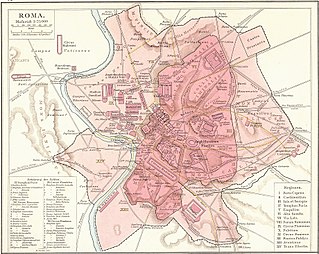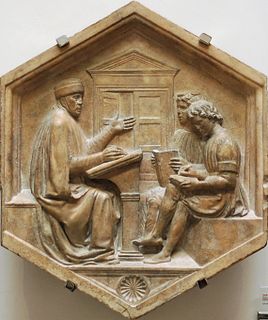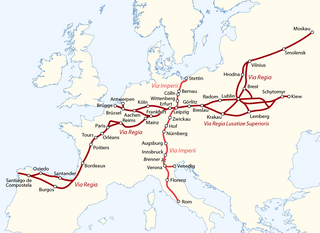The Regia was a structure in the Forum of Ancient Rome, originally the residence of the Kings. Regia may also refer to:

The Regia was a two-part structure in Ancient Rome lying along the Sacra Via at the edge of the Roman Forum that originally served as the residence or one of the main headquarters of kings of Rome and later as the office of the Pontifex Maximus, the highest religious official of Rome. It occupied a triangular patch of terrain between the Temple of Vesta, the Temple of Divus Julius and Temple of Antoninus and Faustina. Only the foundations of Republican/Imperial Regia remain. Like the Curia it was destroyed and rebuilt several times, as far back as the Roman monarchy. Studies have found multiple layers of similar buildings with more regular features, prompting the theory that this "Republican Regia" was to have a different use.
- Latin
- Aqua regia, mixture of concentrated nitric acid and concentrated hydrochloric acid
- Regia Anglorum, British medieval reenactment organisation
- Bulla Regia, former Roman city near modern Jendouba, Tunisia
- Editio Regia, third and the most important edition of the Greek New Testament of Robert Estienne
- Via Regia, "King's Highway"
- "Vivas Schola Regia", song of the Royal High School of Edinburgh.
- Regia, a classical type of building.

Aqua regia is a mixture of nitric acid and hydrochloric acid, optimally in a molar ratio of 1:3. Aqua regia is a yellow-orange fuming liquid, so named by alchemists because it can dissolve the noble metals gold and platinum, though not all metals.

Regia Anglorum, or simply Regia, is a Medieval reenactment organisation reenacting the life and times of the peoples who lived in and around the Islands of Britain from the time of Alfred the Great to Richard the Lionheart. Its members portray Anglo-Saxon, Viking, Norman and British living history from the period before the Norman Conquest. The society has gained in popularity as a result of being featured in prominent television programmes such as Michael Wood on Beowulf, Time Team and A History of Britain.

Bulla Regia was a Berber, Punic, and Roman town near present-day Jendouba, Tunisia. Its surviving ruins and archaeological site are noted for their Hadrianic-era semi-subterranean housing, a protection from the fierce heat and effects of the sun. Many of the mosaic floors have been left in place; others may be seen at the Bardo Museum in Tunis. There is also a small museum connected with the site.
- Italian
- Regia Marina, "Royal Navy" 1861-1946
- Regia Aeronautica, "Royal Air Force" 1923-46
- Scala Regia, "Royal Staircase"
- Sala Regia (disambiguation), "Regal Room or Hall"

The Regia Marina was the navy of the Kingdom of Italy from 1861 to 1946. In 1946, with the birth of the Italian Republic, the Regia Marina changed its name to Marina Militare.

The Italian Royal Air Force was the name of the air force of the Kingdom of Italy. It was established as a service independent of the Royal Italian Army from 1923 until 1946. In 1946, the monarchy was abolished and the Kingdom of Italy became the Italian Republic, whereupon the name of the air force changed to Aeronautica Militare.
Scala Regia is a term referring to a number of majestic entrance staircases, including:
- Spanish
- Fuerza Regia, Mexican professional basketball team based in Monterrey




